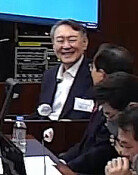Economic Growth 5.3%, Current Account Surplus 300 Million Dollars in Next year
Economic Growth 5.3%, Current Account Surplus 300 Million Dollars in Next year
Posted October. 17, 2002 22:55,
At 17th, Korea Development Institute (KDI), the representative national economic research institute, forecasted the Korean economic growth in next year as 5.3%. It is the lowest numeric value among the announcements of domestic economic research institutes and international organizations.
According to the announcement of `The Report of Economic Forecast on three quarters of year 2002 and year 2003` commented "Recently Korean economy shows stable growth ∇the slowdown of economic growth ∇rapid increase of property price∇the extension of household and private company, etc internal risk factors increase."
The forecast of 5.3% announced by KDI is bellowed by 0.3-0.6% than 5.9% of IMF or 5.6%-5.8% suggested by Samsung Economic research, LG Economic Research or other private researches. It forecasted annual economic growth in this year as 6.1% (6.3% in three quarters and 6.1% in the last quarters).
KDI forecasted ∇increasing rate of consumer price index from 2.9% in this year to 3.6% in next year ∇annual average unemployment rate from 3.0% to 3.2% ∇annual current account surplus from 4.3 billion dollars to 300 million dollars.
Cho Dong-chul, the Team leader of Macro-Economic Team forecasted, "World economy including US will maintain stable economic recovery, but it may be delayed than normal one. So the Korean economic growth will maintain potential growth rate (5%)."
KID forecasted that the growth rate of wage would maintain at high level relatively, and internal material price would also increase. So the price increase rate would be higher in net year than this year. Additionally, as travel account deficit and trade account deficit increase, the current account surplus will decrease.
He warned strongly "Many aggregate index that reflects household ability of payment has already approached US and other developed countries. Specially, the increase velocity is anxious level."
He insisted that fiscal policy should be balanced or contracted, and property price should be stabilized structurally by amending taxation system.
He also insisted that the government should put priority monetary- financial-fiscal policies rather than financial-fiscal-monetary policies.
He advised the economic policy not to be affected by general election and other political matters.
Kwang-Hyun Kim kkh@donga.com




![지하철 타고 가는 북한산성…외국인도 반한 ‘K등산 맛집’[전승훈 기자의 아트로드]](https://dimg.donga.com/c/138/175/90/1/wps/NEWS/IMAGE/2026/01/10/133120824.1.jpg)

![두쫀쿠가 뭐라고…영하 8도에 아이들 1시간 줄세운 어린이집 [e글e글]](https://dimg.donga.com/c/138/175/90/1/wps/NEWS/IMAGE/2026/01/09/133126969.3.jpg)
